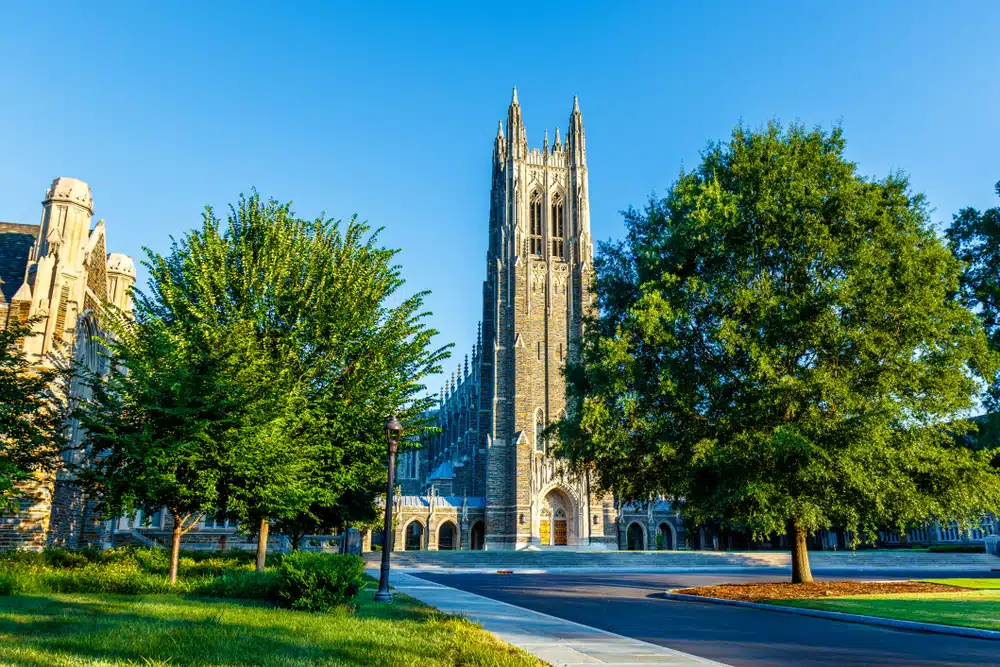What Is the Duke Motto?
The Duke University motto, “Eruditio et Religio”, has been a key part of its identity since its establishment. Held as a guiding principle, it has shaped the institution’s mission and values over the decades. In this article, we delve into this historic motto to uncover its meaning, history, significance, current applications, and controversies.
Understanding the Duke Motto
The Meaning Behind the Words
The Duke’s motto, “Eruditio et Religio”, is a Latin phrase that directly translates to “Knowledge and Religion”. The choice of words is thoughtfully crafted to communicate not just the focus of the institution on academic excellence, but also ethical and spiritual growth.
This dual focus on intellectual and moral development sets Duke apart from many other institutions, marking it as a place where education goes beyond technical proficiency and includes character-building and moral responsibility.
At Duke, the motto “Eruditio et Religio” serves as a guiding principle that permeates every aspect of campus life. It is not merely a slogan, but a philosophy that shapes the curriculum, the student experience, and the values upheld by the university community.
When students first encounter the motto, they are often struck by its simplicity and elegance. However, as they delve deeper into their studies and engage in meaningful discussions, they begin to understand the profound implications of these two words.
Education, as emphasized by Duke’s motto, extends beyond the acquisition of knowledge. It encompasses the development of critical thinking skills, the cultivation of curiosity, and the exploration of diverse perspectives. Students are encouraged to challenge conventional wisdom, ask probing questions, and seek innovative solutions to complex problems.
Religion, on the other hand, is not confined to a single faith or set of beliefs. Duke recognizes the importance of spiritual growth and encourages students to explore their own religious or philosophical traditions while also fostering an environment of inclusivity and respect for different worldviews.
The Language and Translation of the Motto
The use of Latin, the liturgical language of the Western world, was a conventional choice during the time of the motto’s creation. Latin, as a classical language, denotes tradition, prestige, and endurance – qualities also associated with academia.
Literal translations may vary slightly due to the nuances of Latin grammar, but the consensus is that “Eruditio et Religio” represents a commitment to combining scholastic achievement and moral fortitude.
Latin, with its rich history and association with ancient Rome, adds a layer of timelessness to Duke’s motto. It connects the university to a long lineage of scholars, philosophers, and thinkers who have shaped the course of human knowledge and understanding.
Furthermore, the Latin language itself is a testament to the enduring power of education. It serves as a reminder that knowledge is not bound by time or place but is a universal pursuit that transcends cultural and linguistic barriers.
While the literal translation of “Eruditio et Religio” is “Education and Religion”, the meaning behind these words extends far beyond their surface-level interpretation. They encapsulate the essence of Duke University – a place where students are encouraged to grow intellectually, ethically, and spiritually, and where the pursuit of knowledge is intertwined with a commitment to moral values.
History of the Duke Motto
The history of the Duke University motto, “Eruditio et Religio,” is deeply rooted in the institution’s journey from its humble beginnings to its current status as a prestigious educational institution.
Origin and Adoption of the Motto
Duke University, originally established in 1838 as a small rural school named Union Institute Society, underwent a transformative period in 1924. It was during this time that the institution received a generous endowment from James B. Duke, a prominent figure in the tobacco and electric power industries. With this endowment came a new name for the university and the adoption of a motto that would encapsulate its vision.
The phrase “Eruditio et Religio,” meaning “Knowledge and Religion” in Latin, was carefully chosen to reflect the aspirations of both Duke and the educators at the university. It symbolized their commitment to providing not only a world-class education but also to nurturing the holistic development of their students.
With the adoption of this motto, Duke University set itself apart as an institution that valued not only intellectual growth but also the cultivation of moral and spiritual principles.
Evolution and Changes Over Time
Over the years, the wording of the Duke motto has remained consistent, serving as a constant reminder of the university’s core values. However, its interpretation has evolved to align with the changing societal landscape and the diverse perspectives of the Duke community.
Originally, the term “Religio” in the motto referred primarily to Christian religious instruction. However, as Duke University embraced a more inclusive and diverse environment, the meaning of “Religio” expanded beyond specific religious affiliations. It came to represent a broader commitment to ethical principles, social duty, and spiritual development.
This evolution of interpretation allowed the motto to remain relevant and integral to the university’s identity. It reflects Duke’s dedication to adapting to changing societal norms and values while emphasizing the importance of character development as an essential component of a Duke education.
Today, “Eruditio et Religio” stands as a powerful reminder of Duke University’s commitment to fostering intellectual curiosity, ethical responsibility, and personal growth among its students. It serves as a guiding principle that continues to inspire and shape the Duke community as it strives for excellence in education and the betterment of society as a whole.
Significance of the Duke Motto
The Motto’s Role in Duke’s Identity
Bound closely with Duke’s identity, the motto “Eruditio et Religio” strongly resonates with the university’s goal of nurturing not just intellectuals, but also socially conscious citizens. It can be seen in the curriculum, with a strong focus on humanities, and in initiatives aimed at social responsibility and community service.
The motto, which translates to “Knowledge and Religion,” serves as a guiding principle for the Duke community. It represents the belief that education should not only focus on acquiring knowledge but also on developing a sense of moral responsibility and ethical behavior. This emphasis on both intellectual growth and social consciousness sets Duke apart from other institutions.
“Eruditio et Religio” is etched in numerous places across campus, acting as a physical reminder of the university’s core values. From the entrance gates to the buildings and even engraved on the university seal, these words serve as a constant reminder of the ideals that Duke stands for.
Everyone connected with Duke, from students to faculty to staff, is expected to uphold the ideals encapsulated in these words. The motto serves as a unifying force, creating a sense of belonging and shared purpose among the Duke community.
How the Motto Reflects Duke’s Values
The core values of Duke University mirror its motto in numerous ways. A commitment to truth and freedom of inquiry is reflected in “Eruditio”. Duke encourages its students to question, explore, and seek knowledge without limitations. The university fosters an environment where intellectual curiosity is celebrated and where students are encouraged to challenge existing ideas and think critically.
On the other hand, “Religio” underlines a commitment to ethical behavior and social responsibility. Duke believes that education should not only focus on personal growth but also on making a positive impact on society. The university promotes the idea that knowledge should be used for the betterment of humanity and that individuals have a moral obligation to contribute to the well-being of others.
Together, these words reflect Duke’s aspiration: to excel in a broad range of endeavors, contributing to the betterment of society with a profound sense of moral obligation. The motto serves as a constant reminder of the values that Duke holds dear and inspires its community to strive for excellence in all aspects of life.
Through its motto, Duke University aims to produce graduates who are not only knowledgeable and skilled but also compassionate and socially responsible. The motto acts as a guiding light, shaping the university’s culture and inspiring generations of Duke students to make a positive impact on the world.
Duke Motto in Modern Times
The Duke University motto, “Eruditio et Religio”, meaning “Knowledge and Faith,” holds a deep significance in shaping the institution’s identity and guiding its members. It serves as a guiding light for the Duke community, inspiring individuals to pursue intellectual growth and spiritual enlightenment.
The Motto’s Presence on Campus
The motto’s powerful message can be found in multiple locations on Duke’s campus, reinforcing its importance in the university’s fabric. One prominent display is the university’s seal, proudly showcasing the motto alongside other symbolic elements. The seal serves as a visual representation of Duke’s commitment to fostering a harmonious balance between knowledge and faith.
Furthermore, plaques and inscriptions bearing the motto can be found adorning the walls of various buildings across campus. These tangible reminders serve as constant inspiration for students, faculty, and staff, urging them to embrace the values encapsulated within the motto.
As one walks through the campus, the motto’s presence is palpable, creating an atmosphere that encourages individuals to strive for excellence while staying grounded in their beliefs.
The Motto’s Influence on Duke’s Culture and Traditions
The motto’s influence extends beyond mere words etched in stone; it has become an integral part of Duke’s culture and traditions. It shapes the way students, faculty, and alumni perceive and interact with the world.
Duke University places great emphasis on critical thinking and intellectual curiosity, values that are deeply intertwined with the motto. Students are encouraged to explore diverse perspectives, challenge conventional wisdom, and engage in rigorous academic pursuits. This commitment to intellectual growth is a testament to the motto’s enduring influence on Duke’s culture.
Moreover, the motto’s call to action extends beyond the confines of the classroom. Duke’s commitment to community engagement and social responsibility is deeply rooted in the values embodied by the motto. The university actively encourages students to apply their knowledge and skills to address real-world challenges through initiatives like the “Duke Engage” program.
The “DukeEngage” program provides students with transformative opportunities to participate in immersive service projects, both domestically and internationally. By engaging in these civic projects, students not only contribute to the betterment of society but also embody the motto’s principles of knowledge and faith in action.
Additionally, the motto’s influence can be seen in the rich traditions that have developed over the years at Duke. From the spirited camaraderie of basketball games to the solemnity of convocation ceremonies, the motto serves as a unifying force, reminding all members of the Duke community of their shared values and aspirations.
In conclusion, the Duke University motto, “Eruditio et Religio,” is not merely a phrase etched in stone or inked on paper. It is a living embodiment of the institution’s commitment to knowledge, faith, and the pursuit of excellence. Its presence on campus and its influence on Duke’s culture and traditions serve as a constant reminder of the values that define the university and its community.
Criticisms and Controversies Surrounding the Duke Motto
Debates and Discussions on the Motto’s Relevance
Like many historical concepts, the Duke motto has been subject to critique and debate. Some critics argue that the explicit focus on religion may not fully resonate with everyone in an increasingly diverse and secular society.
While the motto, “Eruditio et Religio,” which translates to “Knowledge and Religion,” has been a guiding principle for Duke University since its inception, there are those who question its relevance in today’s modern world.
They argue that in a society that values diversity and inclusivity, a motto that explicitly mentions religion may not be inclusive enough for all members of the university community. They believe that a more inclusive motto could better reflect the diverse beliefs and backgrounds of the students, faculty, and staff.
On the other hand, supporters of the motto argue that it represents an important aspect of Duke’s history and tradition. They believe that the motto serves as a reminder of the university’s roots and the values upon which it was founded. They argue that while society may have become more secular over time, religion still holds significance for many individuals and should not be dismissed.
Furthermore, some critics suggest that the change in interpretation of “Religio” over the years, from a specific religious context to a more general ethical one, is a deviation from the original intended meaning. They argue that the motto’s original purpose was to emphasize the importance of both intellectual growth and religious faith. However, as society has evolved, the meaning of “Religio” has also evolved to encompass a broader sense of ethics and values.
Despite these debates and discussions, the Duke motto remains an integral part of the university’s identity, sparking ongoing conversations about its relevance and interpretation.
Calls for Change and Proposed Alternatives
There have been some calls for updating the motto to better reflect Duke’s current global standing and diverse student body. Proposed alternatives often emphasize inclusivity, ethical leadership, and global learning.
Advocates for change argue that a revised motto could better encompass the university’s commitment to diversity, equity, and inclusion. They propose alternatives such as “Knowledge and Humanity,” “Wisdom and Global Citizenship,” or “Learning and Inclusivity.” These alternative mottos aim to capture the essence of Duke’s values while acknowledging the evolving nature of higher education and the importance of embracing a global perspective.
However, supporters of the existing motto argue that its malleability allows it to adapt to changing times while maintaining tradition. They believe that the motto’s enduring nature is a testament to its strength and relevance. They argue that rather than changing the motto, efforts should be focused on ensuring that the university community upholds the values it represents.
Ultimately, “Eruditio et Religio” continues to stand as a central pillar defining the Duke University ethos. The ongoing discussions surrounding the motto serve as a reminder of the university’s commitment to intellectual growth, ethical values, and the exploration of diverse perspectives.
Having all the necessary information is important before choosing any course of action. AdmissionSight is always here to assist you with any questions or concerns. We have more than ten years of expertise assisting students in successfully navigating the challenging admissions process.
Consult with AdmissionSight and find out what we can do to help you get into the school of your choice by ensuring that you are sufficiently aware and well-prepared for the application process.










































